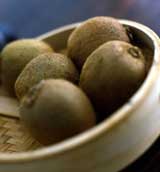If It Says it’s Organic Food…

People can be highly suspicious about organic food. They wonder about its authenticity, especially as it generally costs a bit more than non-organic food. So read on ye cynics, and get the reassurance you want. In short, if it’s food and says it’s organic, you can bet your bottom dollar that it is.
Firstly, anyone wanting to grow or process food which is to be sold as organic must by law be registered with UKROFS or a body approved by UKROFS and be inspected by them at least once a year. The same applies to those importing organic food from outside the EC. The UKROFS-approved bodies operate privately but are all subject to inspection by UKROFS to ensure that their systems and the standards of their inspections conform to the EC Regulation and UKROFS Standards. UKROFS also carries out direct check inspections on farmers and processors registered with the sector bodies as an additional assurance that organic standards are being complied with.
There are also strict production standards. For many years, there have been codes for organic farming prepared by voluntary bodies and applied by their members. In 1993, however, a European community regulation became affective. This describes the inputs and practices which may be used in organic farming and growing, and the inspection system, which must be put into place to ensure this. The regulation also applies to processing aids and ingredients in organic foods. So, all food sold as organic must come from growers, processors or importers who are registered and subject to regular inspection. In the United Kingdom, the United Kingdom Register of organic food standards — UKROFS, administers the regulation. UKROFS consists of an independent board appointed by agriculture Ministers, which is assisted by a small secretariat, provided by the Ministry of Agriculture, Fisheries and Food. Its job is to ensure that the EC Regulation is properly in the UK by various bodies, which register organic farmers and processors.
The EC Regulation also operates throughout the whole European Community, so you can trust organic imported food. Organic food produced under the Regulation may be freely sold within the EC. so you may see the names or symbols of the certifying bodies from other Community countries. A limited number of countries outside the EC are currently recognized as having an equivalent system. Organic food from those countries may also be freely sold. For other countries, the importer must demonstrate to UKROFS (or similar body in another EC country) that the food is genuinely produced to an equivalent standard and inspection system before it can be sold as organic.
The rules that govern the labeling of organic foods come from the EC Regulations. They are designed to ensure that consumers are not misled. In the case of a product in a natural state such as potatoes, the rules are simple: potatoes may be described as organic only if they have been grown by a registered producer of organic foods. You might see on the label “organically grown potatoes”. Though not legally required there may also be a brief description of organic farming and perhaps the logo of the inspection body concerned and the address of the grower or packer.
The EC Regulation currently provides rules for the production of all organic foods. Community standards for animal production are being developed and until these are in place national standards, such as those of UKROFS in the UK, must be used. These regulations aim to keep livestock in good health by promoting high standards of animal welfare, appropriate diets and good day-to-day care of stock. If animals are ill, the farmer must give appropriate treatment. Antibiotics and other conventional medicines are used under veterinary advice and only when no alternative treatment is available or where necessary to save an animal’s life or to reduce suffering. In such cases no product from the animal concerned may be sold as organic for period from the last use of the medicine which in most cases is twice as long as the normal “withdrawal period” for that medicine.
Organophosphorus pesticides cannot be used to treat animals sold for organic meat in any circumstances. There are requirements to ensure humane conditions for animals in transport and at slaughter. In short, organic food isn’t a luxury any more. It’s a readily available, legally bound, water-tight healthy food source for you and your family.
Like this page? Please link to us and let the world know!



